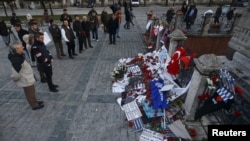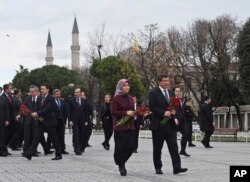Turkey's president said Thursday that military operations would intensify against PKK Kurdish rebels after the group was blamed for a car bombing of a police headquarters, and he promised there would no end to the military operations until the group was eradicated.
President Recep Tayyip Erdogan spoke in response to the bombing of the police headquarters Wednesday in Diyarbakir province in Turkey’s predominantly Kurdish southeast. The region is at the center of a major security crackdown, which local human rights groups say has led to more than 200 civilian deaths, including children and the elderly.
Erdogan also criticized the more than 1,000 academics who in a petition this week condemned the crackdown and called for a resumption of a peace process with the PKK. He said the petitioners had spewed hatred against their state and nation by publicly taking sides with the terror organization.
Meanwhile, Prime Minister Ahmet Davutoglu announced Thursday that the army had carried out a sustained bombardment against Islamic State targets in Syria and Iraq, killing 200 militants, in response to a suicide attack that killed 10 German tourists Tuesday in Istanbul.
Davutoglu said Turkish forces hit 500 IS targets with artillery and tank fire along the border with Syria and near a Turkish camp in northern Iraq. He said the attacks had been carried out within the last 48 hours.
Davutoglu told a conference of Turkish ambassadors in Ankara that if necessary, Turkey would also launch air attacks against the insurgents and maintain a "determined stance" against IS fighters until they leave the border areas. However, Turkey's warplanes have not flown in Syrian airspace since a Turkish pilot shot down a Russian fighter jet in late November.
Davutoglu vowed that "every threat directed at Turkey will be punished in kind." He also promised retaliation against any threat directed at what he called "Turkey's guests."
Turkish Interior Minister Efkan Ala said authorities had arrested seven suspects, three of them Russian nationals, in connection with the suicide bombing. The attack occurred in Sultanahmet Square, home to Turkey's most visited historic sites, such as the Ottoman-era Blue Mosque and the Hagia Sophia, once a Byzantine church, then a mosque and now a museum.
In addition to the 10 killed in the attack, another 15 people were wounded, most of them Germans.
Turkish authorities said the attack was carried out by a Syrian member of Islamic State, Nabil Fadli, 28, who had recently entered Turkey from Syria as a refugee but was not on Ankara's watch list of suspected terrorists.
Few details of the Russian arrests have been given, but observers suggest there could be a Chechen connection, since many jihadists fighting in Syria are linked to the conflict in the Russian state of Chechnya.
Turkey remains one of the main transit countries for jihadists going to Syria.
The Turkish interior minister said everything possible was being done to stop the jihadists, announcing that 36,000 people from 124 countries were now on Turkey's no-entry list.
In addition, over the last few days, Turkey has detained more than 70 suspected IS members, although it was not clear whether they had any connection to the suicide bombing in Istanbul.
VOA's Doran Jones contributed to this report from Istanbul.





